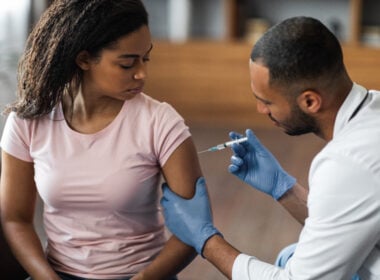Dr. Monique Ruberu is a board-certified OB-GYN serving patients in the specialties of gynecology and infertility at Natural Women’s Health in Meadowbrook, Pennsylvania, about a half-hour drive from Philadelphia. Dr. Ruberu studied medicine at the University of Texas Medical Branch and completed her OB-GYN residency training at Drexel University in Philadelphia. After her residency and a year of a research fellowship, she practiced mainstream OB-GYN medicine for six years. In 2014, Dr. Ruberu became certified in Natural Procreative Technology (NaProTechnology), a specialty in Restorative Reproductive Medicine that uses information from a women’s natural menstrual cycle to diagnose and treat reproductive problems, including issues that contribute to infertility.
Over the course of her career working in mainstream OB-GYN medicine and later specializing in NaProTechnology, Dr. Ruberu came to believe that many reproductive issues and menstrual problems women experience can be treated more effectively with Restorative Reproductive Medicine than with hormonal birth control (the common treatment prescribed by mainstream OB-GYNs and general practitioners for cycle issues). I sat down with Dr. Ruberu for a virtual interview to discuss common reproductive disorders and how she treats them and helps women restore optimal health.
1:11
Can you tell us how NaProTechnology works together with a women’s fertility cycle and medical interventions?
Dr. Monique Ruberu: NaProTechnology is an amazing method of addressing every GYN issue without the use of contraceptives, without the use of IVF. Rather than using those things to act as a bandaid on top of your GYN issues, we instead look for the root causes, and then we address those issues, which is so much more effective.
And we have people learn to chart their cycles to identify ovulation, and then using that point of ovulation we know when to draw tests, when to have you do ultrasounds, all of those things, in order to be able to get to the correct diagnosis, and then address those issues naturally.
2:15
Can you tell us how NaProTechnology in your work helps women with irregular periods?
Dr. Monique Ruberu: When women are coming into my office they are coming in with all of the typical GYN complaints. So when people have irregular cycles, I always stop and say okay what exactly is your bleeding pattern when you have bleeding? Is it spotting, is it light, is it heavy, is it moderate—what are you experiencing? Because every little bit of that information tells us something.
If somebody’s having spotting before their period it means something. If somebody’s having spotting at the end of their period, it means something. If you’re having crazy heavy bleeding, it means something. And so we want all of that information. Then we want to check polycystic ovarian syndrome labs, or a [number] labs that query all of these different issues . . . for thyroid issues, for PCOS, for abnormalities with your prolactin levels. All of that can happen on Day 3 of the cycle.
Following that, we would have somebody chart their cycles to identify where they’re ovulating—do they have any mucus that shows up when they wipe themselves?—and that would tell us where to start looking for estrogen and progesterone after that ovulation so that we can determine if they have normal hormone levels or if they’re low or if they’re high.
4:21
Can you tell us how NaPro and your work with fertility awareness helps diagnose endometriosis—what seems to be a very misunderstood issue in reproductive health?
Dr. Monique Ruberu: Absolutely. With endometriosis, typically people will have premenstrual spotting, so they’ll have spotting before their period, and then they’ll have cyclical pain with every cycle. And with endometriosis, there are so many things that we can do to assist. If it’s very very severe, even at that point I will start patients on natural supplements that will help reduce the pain and help reduce the actual presence of the endometriosis. We give that a three-month trial with a super benign supplement, and then we go from there.
If the pain has improved then that’s fantastic. If the pain continues, then we have to look a little bit deeper and see if this patient needs surgical intervention. If the surgical intervention happens, you want to go with a NaPro-trained surgeon, because that individual will go in and actually look for the endometriosis and remove it, not just burn it. Because when you burn it, it will come back; but if you remove it, then you have a much better chance of resolution.
[After that], you still want to go deeper and you want to look at the hormones underneath it. Do you have higher levels of estrogen, and then what can you do about that?5:57
When it comes to more common period issues like PMS, how can fertility awareness methods and restorative reproductive medicine help women resolve those issues?
Dr. Monique Ruberu: This is huge. So many women have this misconception that when you reach a certain point in your life you’re going to have PMS.
PMS ruins relationships. Typically when you have bad PMS symptoms—especially the anger, the irritability, and the desire to get away from other people—the people that you’re hurting with those emotions are the people that are closest to you. Spouses, children—these are the ones that suffer when you’re dealing with bad PMS. And so I know that most women do not want to hurt anyone especially the people that they love the most.
With NaProTechnology we can absolutely check your hormone levels after ovulation to figure out what the underlying issue is. It could be that you have too much estrogen. It could be that you have too low estrogen and progesterone. And with that information we can then supplement naturally or with medication from the regular pharmacy or with compounded medications—there are so many different options.
In my office, I like to take it a step further, and really talk about diet, exercise, and what you are doing as far as relaxation and meditation and things like that, in order to help you have a more peaceful life and existence. . . . All of these things play into how you can function on a day to day basis.
8:54
When it comes to postpartum depression, a serious mental health condition that needs to be addressed, how can hormonal health inform restorative reproductive medical treatments?
Dr. Monique Ruberu: With these women, it’s [usually caused by] a continuum of this lack of progesterone. So early when they’re starting to have their periods—even at that time they may show signs of low progesterone or polycystic ovarian syndrome. As they get older, their periods may become more irregular, more tail-end brown bleeding; they may have issues when they’re trying to conceive; and then when they do conceive, they may have issues with recurrent miscarriage or pre-term deliveries, all because of lack of progesterone. And then once they get through the pregnancy, then they have issues with postpartum depression. And so it’s really important to have this understanding even before you get pregnant or you get that postpartum depression. If you’re coming to us with postpartum depression, most likely it’s because of a lack of progesterone.
And just with one single progesterone shot, typically the symptoms will go away within 24 hours. And for those who don’t want to take shots, you can even have an oral treatment of progesterone and all of those things help. And then when the cycles resume, you can consider doing the lab work to see what happens after ovulation; are your progesterone levels low, and do you need supplementation on a monthly basis, just for 10 days out of the month—nothing that would in any way postpone your cycles or shut down ovulation or cover up the issues, but rather something to just come up underneath and support your cycle.
11:20
Can you explain the difference between taking synthetic and natural hormones and what they mean health-wise?
Dr. Monique Ruberu: There are two major differences. One is the timing in which it is given. All birth control pills people get on, whether they’re told it’s estrogen-based or progesterone-based… the timing of those pills is that people are to take them every day during the cycle and then stop and take some sort of a placebo pill for five or six days to get a withdrawal bleed. Effectively this is shutting down your cycle, or at least it’s attempting to. So it doesn’t always work, and you might have some breakthrough ovulation, and that’s a whole different topic.
But in using these medications, they are not true progesterone or true estrogen; they are synthetic compounds, which are similar to estrogen or progesterone. And with the use of these, there is an increased risk of cancer, and it’s concerning. So with the use of the supplements we use in NPro, we’re only giving progesterone after the ovulation, when you’re intended to have progesterone, which is completely different. We’re not shutting down your ovulation at all.
20:21
For those who are ready to have a family and are trying to conceive, how can FAM and NaPro help those couples?
Dr. Monique Ruberu: I have so many infertility patients in my practice, and they are amazed because these are women who have maybe tried IVF in the past and have been unsuccessful because they have been given this diagnosis of “unexplained infertility” because nobody was willing to go deep enough to actually look for that root cause. And because of this, I’ve actually put together my own course and coaching program for women all over the world to be able to have a really good understanding of everything underlying your cycle—what is normal and what is abnormal—then how to address that; how to look for all of these different issues, and all of the natural supplements and everything else that you would need in order to conceive and then sustain the pregnancy. That program is called Fertility Solved and you can access that through my website NaturalWomensHealth.com.
Using NaProTechnology, we absolutely utilize it all the time to help women who are trying to conceive pregnancies to have better and safer outcomes, and the coolest part is that you would typically be paying 15,000 for one month of IVF and with Naprotechnology, your cost is way less. You don’t even have to be a millionaire in order to access this care.
22:27
How can fertility awareness help with relationship satisfaction, compared with birth control?
Dr. Monique Ruberu: I think one of the main differences is couples that are using fertility awareness methods—and when they’re using it together as a couple . . . there is just so much more communication that’s occurring between the couple. Every day they’re making the decision together as to whether they are open to conceiving or whether they are going to avoid pregnancy. And so there’s this constant discussion happening between both of them. They’re aware of when PMS symptoms are showing up so he can be more present and more willing to comfort her at those times and not be upset if she’s a little bit more irritable or a little bit sad or depressed; he has a lot more understanding for her at that time, which is huge.
These people also tend to communicate better across the board, because they’re communicating about these really intimate details they tend to share a lot more of their hopes and their dreams . . . and they have a commitment to one another. They’re willing to sacrifice their own personal desires in order to achieve this good within the relationship and to support one another. And so it just naturally lends to a couple that is stronger and has a better chance of success.
Find out more about:











